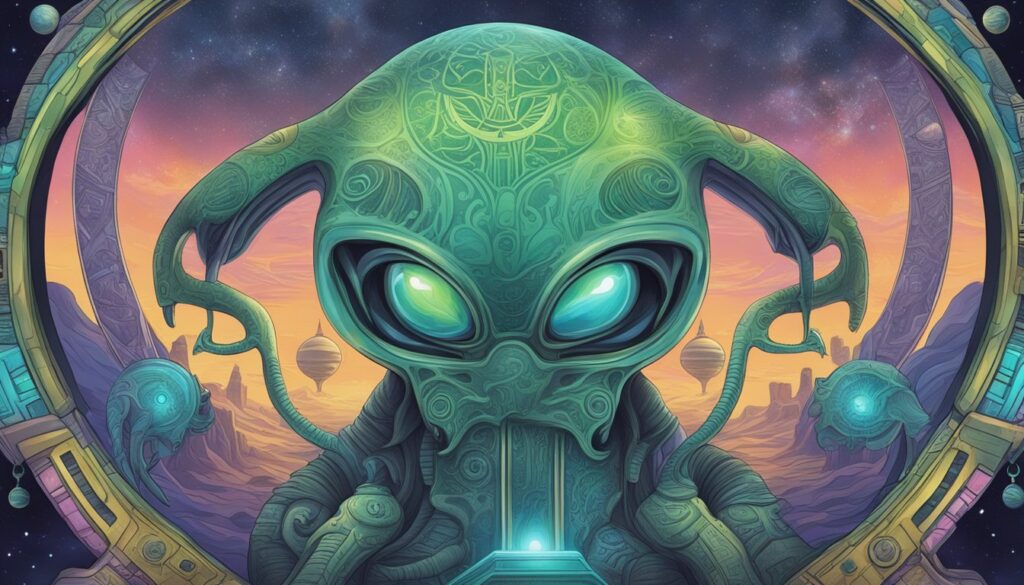Dreams have long fascinated humans, and the imagery within them can transcend the mere personal, reaching into the realm of collective and cultural symbols. Recent studies have revealed that culture significantly influences how individuals perceive and interpret their dreams. In particular, the symbolism of aliens in dreams is a curious subject that provides a rich ground for exploration. Different societies have variable myths, folklore, and media depictions that saturate one’s subconscious and can alter the very fabric of these nocturnal narratives.
Table of Contents
Toggle
Alien dreams, especially, stand as a testament to how external factors shape our private dreamscapes. Scholars have uncovered that a person’s cultural background deeply impacts the way alien figures are represented in their dreams. From guardians and guides to invaders and enemies, the nature of the interaction between dreamers and these otherworldly beings can often be predicted by examining their cultural context. Meanwhile, the psychological underpinnings suggest a commonality in what aliens represent in our subconscious across cultures. These intricate threads of culture, psychology, and symbolism create a web that directly affects what we dream and how we interpret those visions of beings from beyond our world.
Key Takeaways
- Cultural influences profoundly shape the interpretation of aliens in dreams.
- The presentation of aliens in dreams varies significantly across different cultural contexts.
- Psychological commonalities exist in how aliens are symbolized in dreams worldwide.
Cultural Framework and Alien Dream Interpretation

Your understanding of alien dream symbolism invariably intersects with cultural interpretations. This section dissects how culture informs the meaning behind dreams featuring otherworldly visitations.
Historical Context of Dream Symbolism
In ancient civilizations, dreams of celestial beings often signified divine messages. Egyptian hieroglyphs and Greek mythologies, for example, are replete with tales where dreams acted as prophecies bestowed by gods often represented with non-human traits—mirroring today’s alien dream symbolism. This historical lens helps you to see alien dreams not merely as modern occurrences but as contemporary interpretations of age-old phenomena.
Anthropological Perspectives on Alien Imagery
Anthropological evidence consistently reveals that your culture shapes the alien figures seen in dreams. For instance, indigenous societies might interpret dreams of aliens through the lens of ancestral spirits, whereas Western cultures might view them through a more technological or science fiction-oriented perspective. You can recognize this difference in the artistic depictions of aliens in various cultures—ranging from spiritual beings to advanced technological entities.
Societal Views on Extraterrestrial Life
Your societal beliefs about extraterrestrial life greatly influence dream interpretations. The X-Files era in the 1990s, characterized by a surge in UFO sightings and alien abduction stories, infused popular culture with a specific image of aliens that persists in dream symbolism. You can see the shift in dream content parallel to societal events, films, and media that focus on extraterrestrial themes.
Psychological Underpinnings of Alien Dreams

In exploring the psychological aspects of alien dream symbolism, it’s essential to consider the dynamics of the subconscious mind, the influences of cultural elements, and the complex interplay of emotions.
Psychoanalytic Approaches
Within the psychoanalytic framework, dreams about aliens are often viewed as manifestations of repressed desires or deep-seated anxieties. The imagery of an alien can symbolize the unknown aspects of your psyche, with their otherworldly nature reflecting feelings or thoughts that are outside of your conscious understanding.
- Alien as the ‘other’: Symbols of elements in your life that are unfamiliar or repressed.
- UFOs as vehicles of transformation: Vehicles might represent the journey to self-discovery or a transition in your life.
Cognitive Processing of Cultural Symbols
Your cognition—specifically, how you process the barrage of cultural symbols—plays a critical role in how alien symbolism appears in your dreams.
Familiarity:
- Exposure to alien imagery in media shapes their role in your dreams.
- Familiar cultural symbols intertwine with personal experiences to create a unique dream narrative.
Integration:
- Dreams about aliens fuse known symbols with novel experiences, reflecting your brain’s attempt to integrate new information.
Emotional Responses and Cultural Conditioning
The emotional coloring of dreams featuring aliens is often a direct product of your cultural backdrop, which conditions you to respond to extraterrestrial concepts in specific ways.
- Fear and the Unknown:
- Terrifying alien encounters might mirror your fears of the unknown or the unpredictable ways in which you may encounter and interact with different cultures in waking life.
- Curiosity and Wonder:
- Dreams in which aliens appear as benevolent or knowledgeable entities can represent your innate curiosity and openness to new experiences and ideas.
Cross-Cultural Variations in Alien Dream Symbolism

In exploring the impact of culture on alien dream symbolism, you will uncover how societal beliefs shape the interpretation of these enigmatic visions.
Comparative Analysis of Dream Motifs
Dreams involving aliens can vary significantly across different cultures. In the United States, there is a tendency for dreams to reflect themes of abduction and experimentation, often linked to a collective anxiety about the unknown and a reflection of popular media narratives. In contrast, traditional societies, such as those in indigenous Australian cultures, may interpret alien motifs in dreams as spirit visitations, deeply connected to the land and ancestral narratives.
Global Narratives of Alien Encounters
Dreams of alien encounters worldwide exhibit both unique and common elements. In Europe, alien dreams may integrate elements of ancient astronaut theories with their rich historical and mythological background. In Asia, particularly in Japan where the influence of technology is notable, alien dreams can possess a more futuristic characteristic, interweaving spiritual and technological motifs. This underscores the diverse fabric through which cultures interpret the phenomenon of extraterrestrial visitation in dreams.
Cultural Diversity and Dream Semiotics
Understanding dream symbolism requires decoding culturally-specific signs and symbols. In Latin America, the interpretation often intermingles with religious and spiritual beliefs; for instance, alien encounters in dreams may symbolize spiritual messengers. In Middle Eastern cultures, the interplay of religious and contemporary ufological discourse can result in a more complex interpretative framework. This highlights the integral role your cultural background plays in ascribing meaning to the symbols encountered within your dreams.
Modern Media Influence on Alien Dreams

Your dreams can be a tapestry woven from the fabrics of your day-to-day experiences and the media you consume. This section investigates how modern media shapes your perceptions of extraterrestrial beings within your dream world.
Science Fiction and Dream Imagery
Science fiction has long provided visual and conceptual material that your subconscious may repurpose into dream content. Movies such as “Blade Runner” and “Alien” introduce specific alien images and themes that can recur in your dreams. When you sleep, your mind may reinterpret these images, leading to dreams populated by extraterrestrial beings that bear a striking resemblance to those you’ve seen on screen.
Mass Media and Collective Unconscious
Your exposure to alien-related content through mass media could feed into a collective unconscious – a shared bank of images and motifs. News reports or documentaries discussing the potential for extraterrestrial life often use similar iconography, which can etch into your memory. For instance:
- UFO sightings reported in the media
- Documentary photographs of the night sky punctuated with unknown objects
Such repeated exposure contributes to a pool of symbols that universally represent aliens, influencing your dreams on a more communal level.
Popular Culture and Personal Dreamscapes
Finally, your personal connection to alien depictions in popular culture can individualize your dream experiences. Whether it’s a memorable episode of “The X-Files” or the iconic characters from “Star Wars”, these pieces of media can intermingle with your life experiences, resulting in a unique dreamscape that reflects both your reality and the fictional worlds you engage with.
Frequently Asked Questions

Your understanding of alien dream symbolism can vary widely depending on your culture. This section will address some of the pressing queries that often arise.
How do different societies interpret dreams about extraterrestrial entities?
You will find that societies with a rich storytelling tradition often interpret encounters with extraterrestrial entities in dreams as messages from the ancestors or divine beings. While a Western viewpoint might analyze these encounters within the framework of science fiction influences, indigenous cultures may provide them with a more spiritual or prophetic significance.
In what ways do cultural beliefs shape the understanding of dreams involving spaceships?
Dreams with spaceships can be shaped significantly by a culture’s technological advancement and exposure to science fiction media. In technologically advanced societies, spaceships might symbolize innovation or fear of the unknown. On the other hand, cultures less focused on technology might interpret spaceships as foreign entities or harbingers of critical change.
What common themes emerge in the interpretation of dreams involving destruction across cultures?
Themes of apocalypse or catastrophic events are widespread when interpreting dreams involving destruction. These dreams might be linked to a collective fear of pending doom within a society or represent personal anxieties. Cultural folklore and historical events can heavily influence the emotional resonance and interpretation of these themes.
How have historical cultures incorporated the concept of dreams into their understanding of the otherworldly?
Historical cultures often regarded dreams as a bridge to the supernatural or a way to receive messages from otherworldly entities. They included dreamwork as part of their rituals and spiritual practices, and you may observe that visitations by otherworldly beings in dreams were sometimes perceived as omens or divine intervention.
What insights do indigenous cultures provide on the symbolism of flying objects in dreams?
Indigenous cultures can offer unique interpretations that see flying objects as symbolic conveyances to the spirit world or as vessels carrying ancestral wisdom. Your dreams about flying objects might be viewed as insight into your spiritual journey or as a connection to the celestial or ancestral realm.
How do contemporary dream dictionaries integrate cultural perspectives on dreams of planetary annihilation?
Contemporary dream dictionaries attempt to encompass a myriad of cultural perspectives when addressing dreams of planetary annihilation. These might range from representing a fear of existential threats in your waking life to symbolizing a desire for profound personal or societal transformation. They tend to take into account not just common archetypes but also the specifics of individual cultural narratives surrounding end-of-world scenarios.






